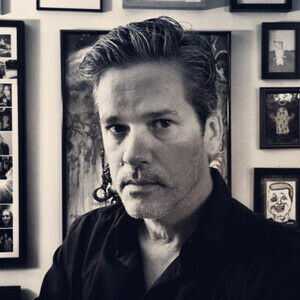Netflix + Stage 32 Present: How to Write Sci-Fi Scripts for Streaming Television
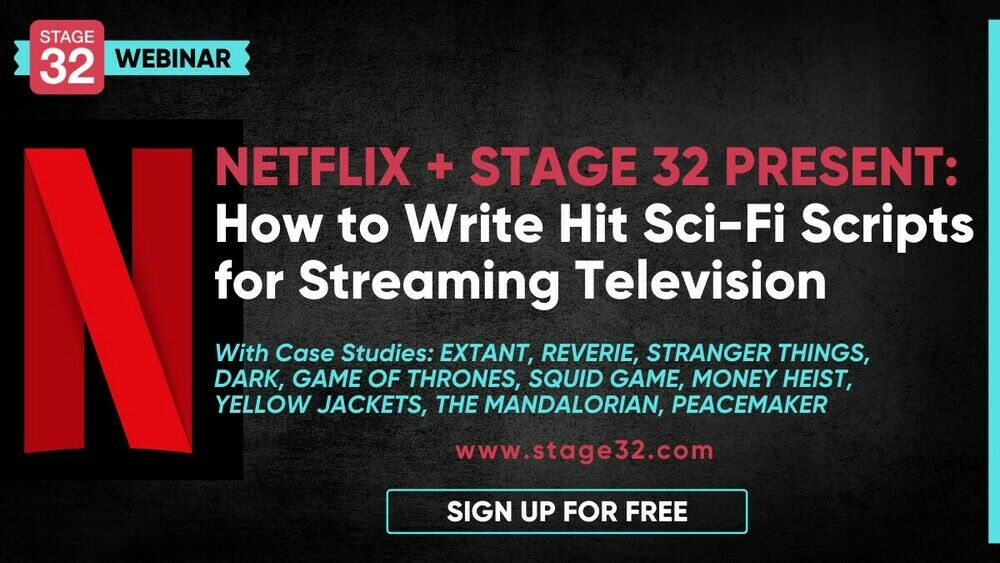
Start Learning
Projects:
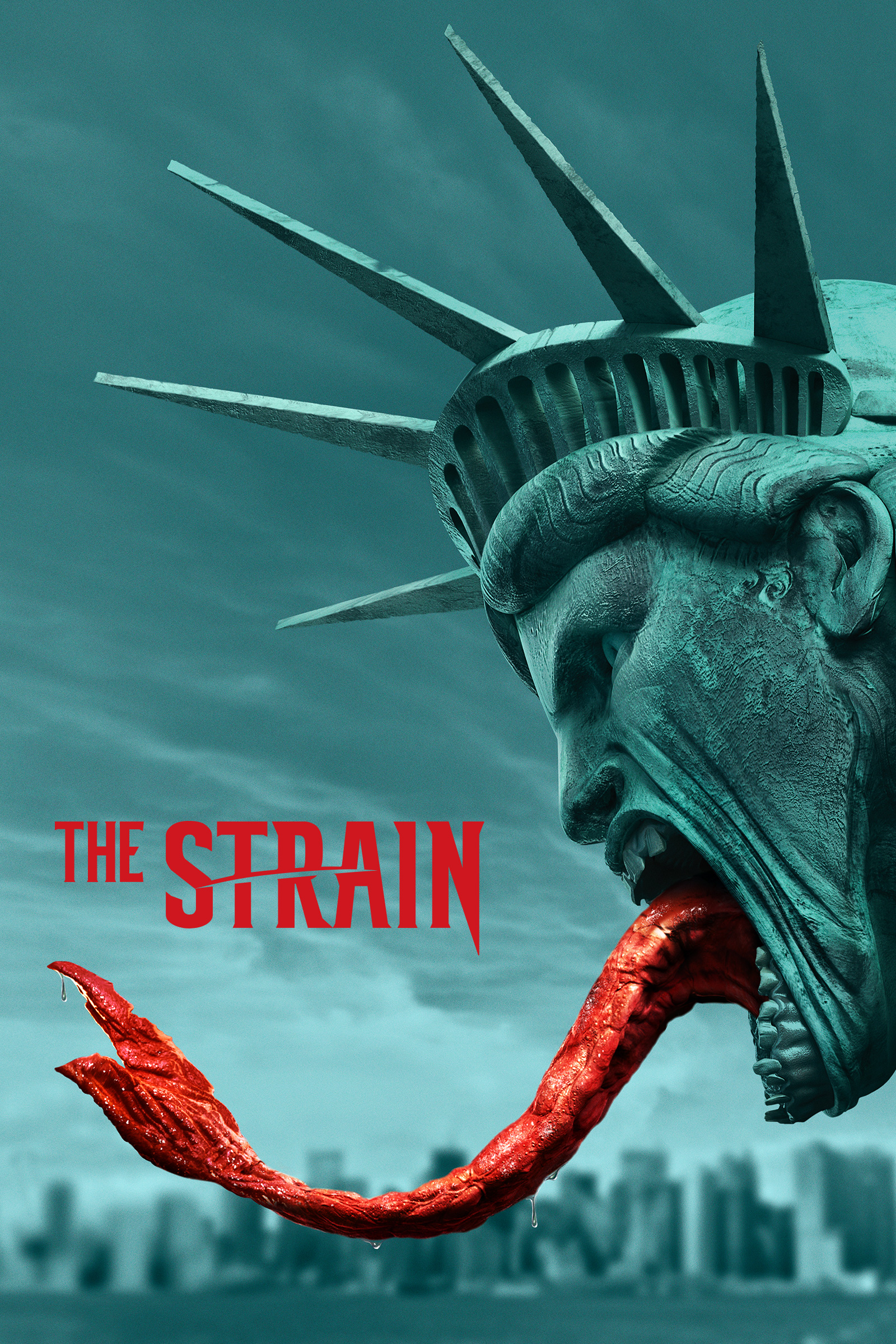
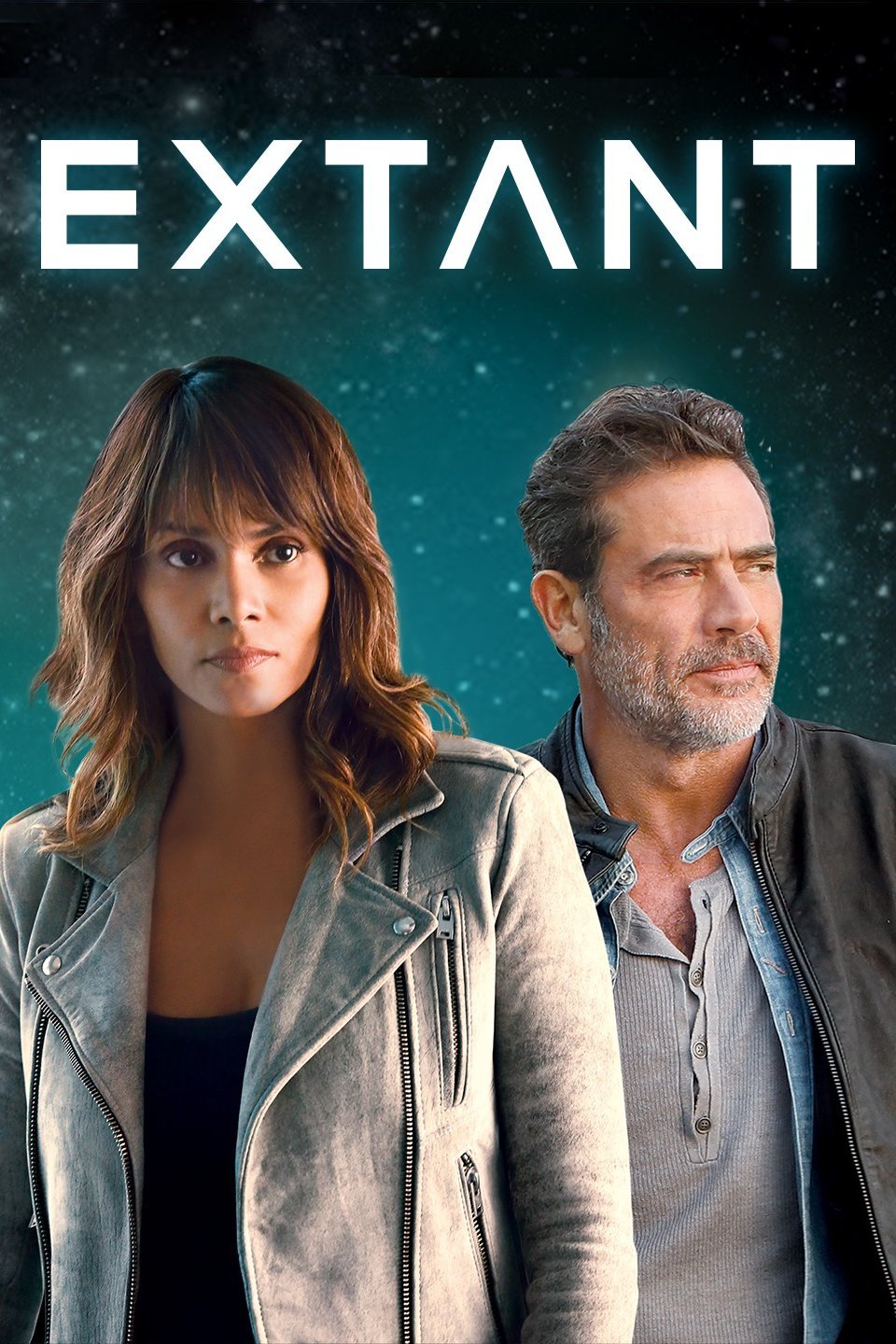
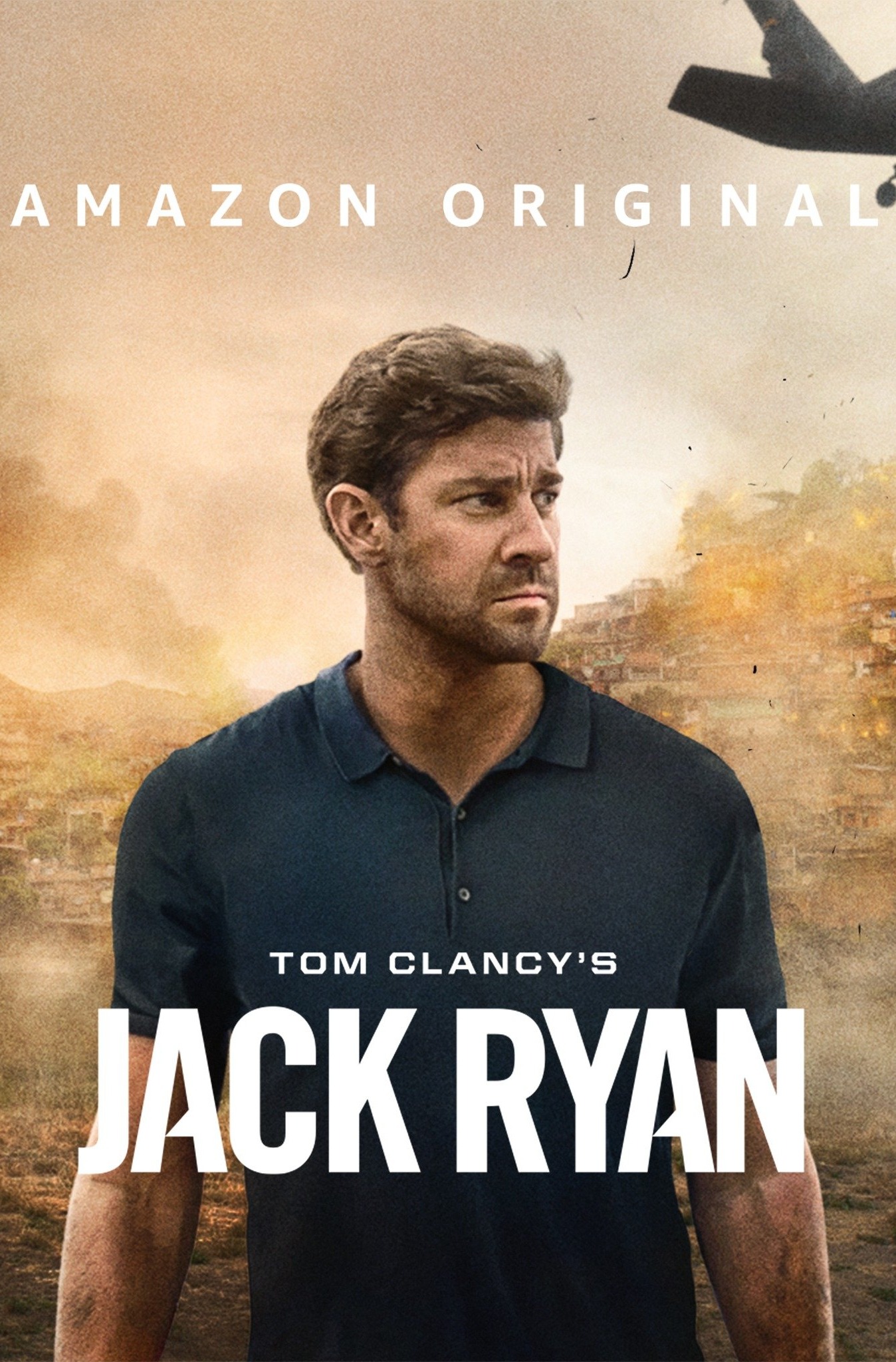
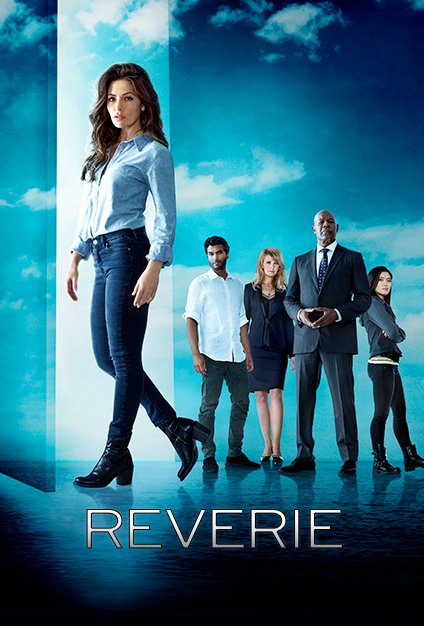


Webinar hosted by: Mickey Fisher
TV Creator and Showrunner (CBS's EXTANT, NBC's REVERIE, National Geographic's MARS)
Mickey Fisher was an unknown writer from Ironton, Ohio when his contest-winning TV script EXTANT caught the attention of Steven Spielberg and later became the science fiction series on CBS starring Halle Berry. Mickey has since firmly implanted himself in the world of science fiction television, creating the NBC series REVERIE and National Geographic’s MARS. He has also served as a consulting producer on Amazon’s JACK RYAN and a writer and co-executive producer on Guillermo Del Toro’s acclaimed FX horror series THE STRAIN. Full Bio »
Webinar Summary
SEE FREQUENTLY ASKED QUESTIONS BELOW

Netflix and Stage 32 have partnered on an exclusive global education series in an effort to democratize the worldwide entertainment industry. Together, over the course of 5 webcasts Stage 32's world class educators will bring their knowledge of what it takes to write, develop and produce today's television for the Stage 32 and Netflix creator community. These global webcasts have been seen by hundreds of thousands of creatives worldwide with a 100% satisfaction rate!
In our fourth webinar in this exclusive "Creating Television Content for a Global Marketplace" series, we are going to give you the ins and outs on how you can effectively write science fiction scripts for streaming television.
Do you have a great sci-fi idea that deserves to be seen?
Television is exploding right now with sci-fi shows that infiltrate our minds like Dark, Squid Game, Yellow Jackets and Stranger Things. Writers with fantastical minds are drawing us into some of the most creative worlds we have ever seen right now, as well as producing some of the most memorable characters. Great shows like Game of Thrones, Extant and Reverie paved the way for the hits we see today and streaming platforms are looking for the next great sci-fi scripts to bring to the world.
In order to tap into this incredible sci-fi landscape you have to be armed with the tools to write a solid pilot and be able to sustain your idea for multiple seasons. It takes a refined approach to understand the nuances of science fiction writing. Stage 32 and Netflix are going to give you the tools to make sure your script is in top shape.
To guide you on your way is producer and writer Mickey Fisher. Mickey broke out onto the scene when his contest-winning TV script Extant caught the attention of Steven Spielberg and later became the science fiction series on CBS starring Halle Berry. Mickey has since firmly implanted himself in the world of science fiction television, creating the NBC series Reverie and National Geographic’s Mars. He has also served as a consulting producer on Amazon’s Jack Ryan and a writer and co-executive producer on Guillermo Del Toro’s acclaimed FX horror series The Strain.
In an exciting FREE webcast Mickey will go into more detail on choosing a sci-fi series concept, core elements of your sci-fi series, planning character journeys, your pilot, season one and beyond, thinking international and believing in your project for the marketplace.
To see the full webinar overview, see below. Some of the case studies Mickey is going to go over in the webinar are:
- Extant
- Reverie
- Stranger Things
- Dark
- Game of Thrones
- Squid Game
- Money Heist
- Yellow Jackets
- The Mandalorian
- Peacemaker
Note: You will receive the Zoom link to login by the morning of the webinar.
If you are not yet a member of the Stage 32 community, we encourage you to join the community today at www.stage32.com, it is FREE! You will instantly connect with over 800,000 creatives and professionals in the entertainment industry from all over the world who use Stage 32 to network, find work, learn and develop their projects. YOU MUST HAVE A STAGE 32 PROFILE TO WATCH YOUR VIDEO.
What You'll Learn
Case Studies: EXTANT, REVERIE, STRANGER THINGS, DARK, GAME OF THRONES, SQUID GAME, MONEY HEIST (not sci-fi but there are some relevant points), YELLOW JACKETS, THE MANDALORIAN, PEACEMAKER
1) Choosing a Sci-Fi Series Concept
- Story Darwinism - 5 questions to ask about your series idea
- Starting with a concept / hook
- Starting With character
- Serialized vs episodic
- Finding your voice
- Fuel and friction - maximizing your chances for a success (scope, budget)
2) Core Elements of Your Sci-Fi Series
- Worldbuilding
- Characters (great characters are subconsciously at war with themselves) C) Setting up A,B & C stories
- Importance of relationships
- Story engine - powering your series through multiple seasons
- Tone
- Theme / premise
- Series logline — your north star
3) “On the Axis” - Planning Character Journeys (pilot, season, series)
- External goals and internal obstacles
- Setting the stakes - the basic questions of drama
4) The Pilot
- The pilot is a contract with the audience
- Hooking the audience early
- Landing your premise by the end
5) Season One and Beyond
- The curse of the “10 hour movie”
- Episodic structure, or “the episode where”
- Tentpole moments of your season and series
- Plot twists
- Common pitfalls (such as unearned character turns, tonal shifts)
6) Thinking Globally - common elements of worldwide success stories
7) Owning Every Word
8) Q&A with Mickey
Want to see the other webcasts in this exclusive Stage 32 + Netflix Creating Television Content for a Global Marketplace series?
Click here: TV Pitch Documents with Chris Mack
Click here: TV Pitch Documents with Chris Mack - Closed Caption
Click here: TV Story Structure with Anna Henry
Click here: Writing Scripts to Budget with Jeanette B. Milio
Click here: Writing Hit Sci-Fi Scripts for Streaming Television with Mickey Fisher
Click here: Writing Hit Comedy Scripts for Streaming Television with Vijal Pital
Click here: Writing Hit Drama for Streaming Television with Leila Cohan
About Your Instructor

Mickey Fisher
FAQs
Q: How do I watch my webinar live?
A: If you received a confirmation that your webinar is on Go to Webinar, you will receive an email from Go to Webinar with further instructions for participating in the live webinar. You can also access your webinar link in your purchase history located under settings in the top right-hand corner of your Stage 32 profile.
If you received a confirmation that your webinar is on Zoom, you will receive a separate email from Zoom with further instructions for participating in the live webinar. Your login link will not be in your Stage 32 profile. If you did not receive your link via Zoom please email support@stage32.com.
Q: How do I watch my webinar on demand?
A: You will be able to watch your webinar on demand as many times as you’d like inside your Stage 32 profile. The recording is processed and posted between 24-48 hours after the webinar concludes. You can follow the instructions below.
YOU MUST HAVE A STAGE 32 PROFILE TO WATCH YOUR VIDEO – STAGE 32 IS FREE TO JOIN
If You Already Have a Stage 32 Profile:
- Log into your Stage 32 profile
- Click "Settings" in the top right-hand corner (gear icon)
- Click "Purchase History"
- Choose this webinar and click the link to view
- Go to www.stage32.com
- Create a profile using the SAME email address you used to sign up for this webinar. The email addresses must match in order to watch the webinar.
- Once you have your profile set up, you can view the webinar by clicking "Settings" in the top right hand corner (gear icon)
- Click "Purchase History"
- Choose this webinar and click the link to view
Q: What is the format of a webinar?
A: Stage 32 Next Level Webinars are typically 90-minute educational broadcasts that take place online using a designated software program from Stage 32. Your webinar will be taught by a working industry professional with in-depth teaching on a topic. If you are able to attend live you will be able to ask your Stage 32 Educator questions during Q&A.
Q: What are the system requirements to watch my webinar live?
A: You will need to meet the following system requirements in order to run the webinar software: Windows 7 or later Mac OS X 10.9 (Mavericks) or later.
If you have Windows XP, Windows Vista and Mac OS X 10.9 (Mountain Lion): The webinar software does not support these operating systems. If you are running one of those operating systems, please upgrade now in order to be able to view a live webinar. Upgrade your Windows computer / Upgrade your Mac computer.
Q: What if I cannot attend the live webinar?
A: If you cannot attend a live webinar or purchase an on demand webinar, you will have access to the entire recorded broadcast, including the Q&A.
Q: Will I have access to the webinar afterward to re-watch?
A: Yes! Like all Stage 32 education, after the purchase of a live or on demand webinar, you will have on-demand access to the recording.
Q: How do I get a copy of the handouts provided?
A: If the webinar you take included handouts you can find them as downloads underneath your on demand video. You must be logged into your Stage 32 profile to view the video and get the handouts by clicking settings in the top right hand corner, then clicking purchase history.
Q: What if I need accessibility and accommodations?
A: Email support@stage32.com to request accommodations.
Thanks for your loyalty to Stage 32 Education. We value having you in the Stage 32 community.
If you have any further questions, we are always happy to help. Please contact Stage 32 support at support@stage32.com.
Relevant Tags
Share with friends:
Questions?
Other education that may be of interest to you:
The Breakdown Webcast: Antiheroes
We're kicking off the first Writers' Room of 2020 with a deep dive into antiheroes - one of the most difficult character types to write. During this supersized 90 minute webcast, Director of Script Services, Jason Mirch explores the complexities of characters from some of our favorite films and television series including Joker, Kill Bill, The Social Network, The Irishman, "Fleabag", "The Sopranos", "Sherlock" and more to find out what makes them tick...and why we love them. We discuss the how screenwriters craft compelling antiheroes and I will give you specific types of antiheroes to consider when writing as well as tips on how to write them!
Stage 32 Screenwriting Class: How to Better Approach and Sign With a Literary Manager to Advance Your Screenwriting Career - With a Query and Writing Sample Workshop
Learn how to approach managers the right way to get the representation you need to further your career from a literary manager at The Cartel, with clients on IT'S ALWAYS SUNNY IN PHILADELPHIA, THE UPSHAWS, LUCIFER, and more! All writers think they have the next great screenplay or series. And maybe you do! But to get the proper feedback, get the script into market shape, and have a confidant on the business side of your pursuits to get your work out there, having a great manager who's plugged in can make all the difference. It’s your manager who often is the key to getting in front of execs, getting staffed on a TV show, and building your career to writing full-time. But as most writers can attest, finding a manager can be HARD. That doesn’t mean it’s impossible, though. It’s more in your power than you may think. Most managers will tell you that most newer writers make the same mistakes when looking for a manager that can prevent them from ultimately finding representation. The good news is that these mistakes are easily avoidable and can be replaced with effective strategies and actions that can greatly help your chances. It’s time to hear from a successful literary manager herself on how she finds clients and what you can do to find the representation you need for your own career. Audrey Knox is a TV literary manager at The Cartel, a premiere management company with clients on shows including the Emmy-nominated IT’S ALWAYS SUNNY IN PHILADELPHIA, Golden Globe winning CALIFORNICATION, THE VAMPIRE DIARIES, BONES, LUCIFER, HAPPY!, BLACK LIGHTNING, STAR TREK: DISCOVERY, and more. For years, Audrey has been helping clients get their work in front of execs and networks and most recently staffed one of her clients on THE UPSHAWS for Netflix. As an established and successful literary manager, Audrey has seen more than her fair share of queries and writing samples and has met her fair share of hungry writers. She knows very well what mistakes most writers make and how the writers she ends up working with find success. And now she’s going to lay it all out for the Stage 32 community. In a special and exclusive 2-part on-demand class, Audrey will give you the tools you need and the strategies you’ve been lacking to put your best foot forward and better your chances of getting a great literary manager for your own screenwriting or TV writing career. In the first session, Audrey will walk you through how to approach managers the right way and explain the proper approach to query letters, writing samples, bios, and loglines. She even dissects brave volunteers’ own query letters and writing samples. After laying out this approach, Audrey will leave you to put these skills to use and actually reach out to managers on your own! The second session will discuss how the new approach worked and then dive into next steps you can take as a writer once you have an interested manager, including signing, how to be a good client that your manager will want to keep on board, and the other members of your team you may or may not need, like agents and lawyers. If you’ve been struggling to find representation, there are likely things you can be doing differently to better your chances. here’s no one better than Audrey to help you adjust your approach and ultimately get the representation you’re looking for. Praise for Audrey's Teaching: "I can't say enough good things about Audrey. She cares about helping her students and provides very valuable information. I wish she was MY manager!" --Sam R. "I didn't realize how much should go into reaching out to reps until I took this class from Audrey. I was doing it all wrong!" -- Morgan B. "Audrey is one of the best teachers on Stage 32. I can't recommend learning from her enough." -- Sydney M.
How to Break In And Excel in a TV Writers' Room
Do you want to break in and get staffed in a TV writers' room? Being a successful writer in the world of television is only possible if you’re successful in a writers’ room setting, and as it turns out, you need more than just writing chops to shine in this context. Pitching ideas, working and getting along with fellow writers, story editors, and showrunners, overall presentation and how you hold yourself—all of this plays a role in how well you do in a writers’ room and how you can build your career as a TV writer and producer. For these reasons, it’s critical to understand how writers’ rooms work and how to best to perform. As it turns out, not all writers’ rooms are built equally. Rules and expectations change depending on the genre of the show, the network or platform, who the showrunner is, and how many writers there are. As a result, this is not a one-size-fits-all situation, and writers who might fit in well at a episodic network drama room might have to adjust if they are later staffed in, say, a comedy room for a streamer. That said, there are still strategies, tools, and things you can understand to better break into a room, fit in, and rise through the ranks. Let’s take a closer look. Mike Gauyo is an accomplished TV writer who has most notably written on Netflix’s hit series GINNY & GEORGIA. Originally born in Port Au Prince, Haiti, Mike broke into Hollywood as a production assistant on reality shows like AMERICAN IDOL and SO YOU THINK YOU CAN DANCE until being discovered by Issa Rae who staffed him as a writer on her fiction podcast FRUIT. Mike entered the world of TV writers’ rooms serving as a writers’ assistant on the TNT show CLAWS and currently serves as Story Editor on the final season of HBO’s comedy hit INSECURE. Mike is also developing his own content and at the top of 2021 launched a mentorship program for pre-WGA Black writers, called the Black Boy Writes & Black Girl Writes Mentorship Initiative. Mike’s varied background in TV writing has allowed him to experience many different writers’ rooms and has given him a keen sense on how to best write and perform in these settings. In this exclusive Stage 32 on-demand webinar, Mike breaks down how different TV writers’ room work, and how you can best break in and interact in these settings to build your own TV writing career. He’ll lay out the different types of writers’ rooms and go through the general hierarchy of any room, from assistants to showrunner. He’ll offer advice and strategies on how you can best break into a writers’ room in the first place and then explain how to work your way up once you’re in, including getting promotions and finding opportunities for set or production experience. He’ll finally teach you what good etiquette in a room is, how to form relationships, pitch and effectively work with everyone else in the room. Whether you're currently in a writers' room looking to advance or move to a different show, or a writer looking for your first television experience, Mike will offer the knowledge, strategies, and perspective to help you take the next step you're looking for. Praise for Mike's Teaching: "Well, I now know who to turn to for help and all my questions on TV writing - Mike! He's an amazing educator. Seriously. Bravo to Stage 32 for having this quality of teacher on the platform." - Markus M. "Definitely informative and helpful for anyone looking to get into writing!" - Sarah L.
An Inside Look of the Stage 32 Writers' Room: Writing Romantic Comedies
A Vice President of Development at an A-List production company recently said,"Every studio executive is asking me for Rom Coms!" If you look at recent trends, it is clear they are on a come back. With the tremendous box office success of CRAZY RICH ASIANS, BOOK CLUB and THE BIG SICK and the streaming successes of SET IT UP, SIERRA BURGESS IS A LOSER, and TO ALL THE BOYS I LOVED BEFORE, romantic comedies are making a huge comeback for all types of audiences. Variety called Rom-Com's the "Hottest genre". If you have been sitting on a Rom-Com script or been thinking about writing one, now's the time to learn about the current marketplace for romantic comedies. So how do you as a writer approach writing a Romantic Comedy without falling into the trap of tired cliches? Or, how do you take the storytelling conventions and turn them on their head? Jason Mirch is a 10+ industry veteran who's worked in development on films for Image Nation such as THE BEST EXOTIC MARIGOLD HOTEL, FLIGHT, CONTAGION, as well as in management, financing and producing. Jason is Stage 32's Director of Script Services and has helped dozens of writers in the Stage 32 community springboard their careers. He's the host of the Stage 32 Writers' Room which is a weekly online writers' group that meets online with writing challenges and one-on-one access to top industry professionals who serve as mentors and provide advice on the group's projects. During this 90-minute look inside the Writers' Room Breakdown Webcast, Jason will go over the history of romantic comedy as well as the anatomy of a romantic comedy. He'll teach you the 7 essential story beats in a romantic comedy and you will learn to develop your romcom with a theme or dramatic question. Plus, Jason will break down scripts including WHEN HARRY MET SALLY, 500 DAYS OF SUMMER, THE APARTMENT, KNOCKED UP, WHAT WOMEN WANT and more. Jason will discuss what makes these projects work and how we can apply those same principles to our writing! Plus! Jason will be taking ANY of your writing questions! Like what you heard from Jason during this webcast? Send him your screenplay and speak with him privately for an hour by clicking here! Praise for This Writers' Room Webcast: "Thanks for this summary! Loved the rundown ad the clips!" - Bethany B. "Such an insightful breakdown, thanks so much." - Crispin "Jason, you always overdeliver! THANKS so much!" - Petula "This was an amazing breakdown. Wow." - Ricki L. "Great breakdown as always, Jason, with superb choice of clips." - Stephen P.
An Inside Look at Revenue Sharing for TV Productions
Everyone wants to get into TV these days, and everyone IS getting into TV these days! With demand on the rise, so is independent TV production and savvy international co-productions. The field is opening up and it’s more than possible to create, sell and be profitable on your own independent TV series. However, there are some crucial things to understand about independent TV that differ from traditional TV models. One big difference is revenue sharing and how to track and distribute money that comes in. This is absolutely essential for any television producer who's working towards creating a profitable series. Understanding revenue sharing in independent TV production models is so important because there are multiple pieces that can confuse someone who has never had experience in independent production. Deal terms may be unclear, and sometimes even conflicting if you’re not careful and aware of all the varying pieces and players! Even though revenue comes later, you have to understand it and plan for how everything fall together from the start. This part of TV production can be overwhelming, but we’ve got just the person to give you the right guidance so you can walk into any TV production with confidence! David Zannoni is an international business specialist for Fintage House in the US, Europe, Canada and Latin America territories. Fintage House, the world's most respected company for revenue and rights protection for industry professionals and companies. David negotiates agreements for films and television series and is involved in business development and relationship management globally on hundreds of productions. David is continuously present to make deals and speak at international film markets, festivals and conferences, including: the Cannes Film Festival, the European Film Market (EFM) in Berlin, the American Film Market (AFM), Ventana Sur, the Bogota Audiovisual Market (BAM), and the Toronto International Film Festival (TIFF), and travels regularly to the United States, the Netherlands, Europe, and all over Latin America. In this webinar, David will show you how independent TV shows generate money and what you need to do to properly share revenues. He will break down TV production models, the financing and distribution of independent TV, and how revenues for TV productions are generated and shared. He’ll also teach you the stages of a TV project as it relates to financing, distribution, and revenue sharing, along with guild obligations and how to manage revenue sharing through Collection Account Management for TV projects. If you’ve got questions, David’s got answers! Knowledge is power, and this webinar will leave you ready and empowered to take on independent TV production! Praise for David's Previous Stage 32 Webinars "David is incredible and lovely and clearly knows his stuff." -- Cynthia P. "Eye-opening information. A no-brainer approach that wouldn't be so obvious to the uninitiated." -- Gary O. "By far, the best class I've seen on the subject." --Kirk K. "David is a fantastic teacher. And what a voice! I could listen to him all day. More importantly, I learned so very much!" -- Isabella T.
Horror Screenwriting 101
Learn the fundamental elements you need to incorporate into your horror feature film screenplay to make it attractive to producers, studios, financiers, streamers, and talent from Sean Keller, a screenwriter who has worked with Blumhouse, Hulu, Lionsgate, and more! Plus! You'll receive the scripts for ALL THAT WE DESTROY and John Carpenter's L.A. GOTHIC! Every Horror film you’ve ever seen starts out as a well-crafted and structured screenplay. This means people are going to have to read your script and decide whether or not it’s worth the time and money to turn it into a movie. You may have tons of great horror set pieces you can’t wait to terrify audiences with but unless your screenplay is compelling and maintains the reader’s interest, your script may never progress into a movie on the screen. The first priority of any writer, horror or otherwise, is storytelling. Before you make a great horror film, you’ll need a well-crafted horror screenplay. Horror movies are not just about terrifying the audience - most importantly they are about telling a story. The story is what makes us care about the characters and the hell they are about to go through. You could have the most original scares imaginable, but if we don’t care about the story and characters then we won’t care about what happens during your horror set pieces. Without elements of structure, character development, tone, and theme a producer may stop reading your screenplay, making it highly unlikely they’ll be interested in making your film. In this exclusive Stage 32 on-demand webinar, you will learn the fundamentals of how to develop and write (or rewrite) your horror feature film screenplay so that it can get the attention of producers, studios, and reps. Teaching you everything you need to know about writing your horror script is Sean Keller, a professional screenwriter and script doctor who has worked for Blumhouse, ABC, Lionsgate, as well as numerous independent production companies. Sean began working in the entertainment industry as an actor (Roger in 1st National Tour of RENT) before turning to screenwriting and his first love, horror. Sean has written for legendary horror directors Dario Argento (GIALLO) , John Carpenter (THE WARD) and Chelsea Stardust (ALL THAT WE DESTROY) and stars such as Nicolas Cage, Danny Glover, and Adrien Brody. Through his own experiences writing and producing horror films as well as fixing other writers’ scripts and teaching screenwriting and production to countless students and aspiring filmmakers, Sean has a keen sense of what makes a script successful in the horror genre and will be sharing what he knows exclusively with the Stage 32 community. Sean will walk you through everything you need to know to make your horror screenplay attractive to producers, investors, distributors, and talent including the current trends in the horror genre and market, how the business of horror writing works, how to best develop the characters in your horror screenplay, how to properly structure your horror feature film screenplay for maximum effect, and so much more. ***Sean will also teach you what you can do after completing your script to get your movie made and further your career as a screenwriter.*** PLUS! You'll receive exclusive handouts to help on your horror writing journey. Downloads include the scripts for: ALL THAT WE DESTROY (Blumhouse/Hulu) John Carpenter's un-produced film L.A. GOTHIC











